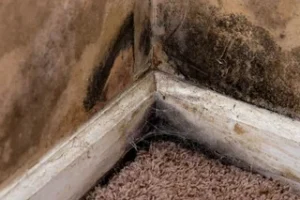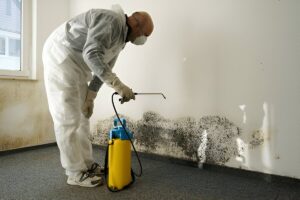Mold growth in commercial spaces can pose significant challenges, not just to the physical structure but also to the well-being of employees and clients. Understanding the nature of mold, the reasons it proliferates, and the best strategies for its remediation is essential for maintaining a safe and healthy workplace. This article will explore expert mold remediation, detailing effective methods, preventive measures, and the importance of professional help.
Understanding Mold: What You Need to Know
The Nature of Mold
Mold is a type of fungus that thrives in moist environments. It reproduces through tiny spores that can float in the air and settle on surfaces. When these spores land in a damp area, they can grow and multiply rapidly, often within just 24 to 48 hours. Common types of mold found in commercial buildings include Aspergillus, Penicillium, and Stachybotrys chartarum, the latter often referred to as “black mold.”
Health Implications
Mold exposure can lead to various health issues, particularly for individuals with respiratory conditions, allergies, or weakened immune systems. Symptoms may include:
- Coughing and sneezing
- Nasal congestion
- Skin irritation
- Eye irritation
- Fatigue and headaches
In severe cases, prolonged exposure can result in more serious health complications, making prompt remediation crucial.
Common Causes of Mold Growth
Understanding the root causes of mold growth is vital for effective remediation. Key factors include:
- Moisture: Leaks from roofs, pipes, or HVAC systems can create ideal conditions for mold.
- Humidity: High indoor humidity levels, often exceeding 60%, can promote mold growth.
- Poor Ventilation: Inadequate airflow can trap moisture and lead to mold issues.
- Water Damage: Any water intrusion, whether from flooding or spills, can result in mold if not addressed quickly.
The Importance of Commercial Mold Remediation
Protecting Your Business
Mold can have detrimental effects on a business’s reputation and bottom line. Customers may be deterred from entering a mold-infested establishment, and employees may experience health issues, leading to increased absenteeism. Effective mold remediation not only protects the physical space but also safeguards the business’s reputation.
Legal and Insurance Considerations
Many states have regulations regarding mold remediation. Failure to address mold issues can lead to legal consequences and potential liabilities. Furthermore, insurance policies may cover mold damage, but only if the issue is reported and managed promptly. Engaging professional remediation services can help navigate these complexities.
Enhancing Indoor Air Quality
Mold contributes to poor indoor air quality, which can affect employee productivity and health. By removing mold and its sources, businesses can improve air quality, leading to a healthier work environment.
Steps in the Mold Remediation Process
Initial Assessment
The first step in commercial mold remediation is a thorough assessment of the affected area. Professionals will look for visible signs of mold, water damage, and sources of moisture. This assessment helps determine the extent of the problem and the necessary remediation strategies.
Containment
To prevent mold spores from spreading during the remediation process, containment is crucial. This can involve sealing off affected areas with plastic sheeting and using negative air pressure systems to keep spores from circulating throughout the building.
Air Filtration
Specialized air filtration systems, including HEPA filters, are used to capture airborne mold spores. This step is essential in maintaining air quality during the remediation process.
Mold Removal
Once containment and filtration are established, the actual removal of mold can begin. This may involve:
- Cleaning non-porous surfaces with antifungal solutions
- Disposing of porous materials that cannot be salvaged, such as carpets or drywall
- Treating the area with antimicrobial agents to prevent future growth
Restoration
After mold removal, restoration work may be necessary. This can include repairing water damage, replacing materials, and ensuring that the area is returned to its original condition.
Preventive Measures for Mold Growth
Regular Inspections
Conducting regular inspections of commercial properties can help catch mold issues early. Look for signs of moisture, leaks, or water damage, and address them promptly.
Moisture Control
Implementing moisture control measures is vital in preventing mold growth. This can include:
- Repairing leaks and maintaining plumbing systems
- Using dehumidifiers in areas prone to high humidity
- Ensuring proper ventilation in bathrooms, kitchens, and other moisture-prone areas
Employee Training
Training employees to recognize the signs of mold and understand the importance of reporting water damage can help in early detection and remediation efforts.
Emergency Response Plan
Having a clear emergency response plan in place for water damage can minimize the risk of mold growth. This plan should outline steps to take in the event of a water leak or flood, including who to contact and how to mitigate damage.
Choosing the Right Mold Remediation Service
Credentials and Experience
When selecting a mold remediation service, it’s essential to choose a company with proper credentials and experience in commercial mold remediation. Look for certifications from organizations like the Institute of Inspection, Cleaning, and Restoration Certification (IICRC).
Comprehensive Services
A reputable mold remediation company should offer a full range of services, including assessment, containment, removal, and restoration. This ensures that all aspects of mold remediation are covered.
Transparent Pricing
Choose a company that provides clear and transparent pricing for their services. This helps avoid unexpected costs and ensures that you understand what you’re paying for.
The Role of Technology in Mold Remediation
Advanced Detection Methods
Modern technology plays a crucial role in mold remediation. Infrared cameras, moisture meters, and air quality testing can help identify hidden mold and moisture sources that may not be visible to the naked eye.
Innovative Remediation Techniques
Emerging technologies, such as ozone treatment and dry ice blasting, offer innovative solutions for mold remediation. These methods can be effective in removing mold without causing damage to the surrounding materials.
Continuous Monitoring
Some companies offer continuous monitoring systems that track humidity and air quality in commercial spaces. This proactive approach can help identify potential mold growth before it becomes a significant issue.
FAQs About Commercial Mold Remediation
How Long Does Mold Remediation Take?
The duration of mold remediation depends on the extent of the mold problem. Minor issues may take a few days, while extensive mold infestations can require a week or more to resolve.
Can I Stay in My Office During Remediation?
In some cases, it may be possible to remain in the office during remediation, especially if the affected area is contained. However, it’s best to consult with the remediation professionals to determine the safest course of action.
What Should I Do if I Suspect Mold in My Office?
If you suspect mold in your office, it’s essential to act quickly. Contact a professional mold remediation service for an assessment and initiate the remediation process as soon as possible.
Final Thoughts
Addressing mold issues in commercial spaces is not just a matter of aesthetics; it’s a fundamental aspect of maintaining a safe and healthy work environment. By understanding the nature of mold, implementing preventive measures, and engaging professional remediation services, businesses can safeguard their employees, clients, and overall reputation. Staying proactive and informed about mold remediation will ensure that your commercial space remains a safe haven for all who enter.
For more information about Commercial Mold Remediation in New Brunswick New Jersey please contact:
Business Name: New Jersey Mold Specialist
Address: 92 Bayard St # 203, New Brunswick, NJ 08901, United States
Phone: (732) 973-9352
Website: https://njmoldspecialist.com/




